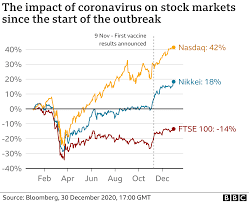We observe empirically that the stock market and growth evolve in parallel. But is it the stock market that impacts growth, or growth that influences stock prices?
Growth influences the stock market
The value of a business is the sum of its future profits. So when the economy is in crisis and growth slows, corporate profits are reduced, which automatically lowers the value of publicly traded companies .
This mechanism was clearly observed in 2008, when the real estate bubble burst in the United States. The downturn in the real estate market led to an economic and banking crisis, which automatically lowered the value of companies on the stock exchange.
A similar situation reoccurred in the spring of 2020 with the Covid-19 crisis. Indeed, the paralysis of the global economy has led to a stock market plunge due to the expected drop in corporate profits (the CAC 40 experienced its largest daily decline on March 12, 2020, with a drop of 12.28%) .
But the stock market can impact growth
However, the relationship can work in the opposite direction: a stock market crisis can slow growth .
This goes through two mechanisms. The first is linked to a drop in household consumption in reaction to a drop in their wealth. Indeed, if stock market prices fall, the value of the assets held by households that own shares decreases. In response, households reduce their consumption. This is what economists call the wealth effect .
The second mechanism goes through the channel of business financing . If prices are lower, companies have more difficulty in financing themselves through capital increases (ie the sale of shares). Thus, a plunge in the stock market penalizes business investment, and therefore growth.
At the turn of the 2000s, growth slowed following the explosion of the “internet bubble” . The end of the 1990s was marked by an excessive surge in stock prices, driven by the optimism surrounding companies in the IT sector. When the speculative bubble burst, growth was held back by the two mechanisms described above.
The stock market has a stronger impact on growth in the United States than in Europe. Indeed, American households have a larger stock market wealth (for their retirement in particular). In addition, American companies finance themselves more via the stock market than their European counterparts who favor bank financing.
